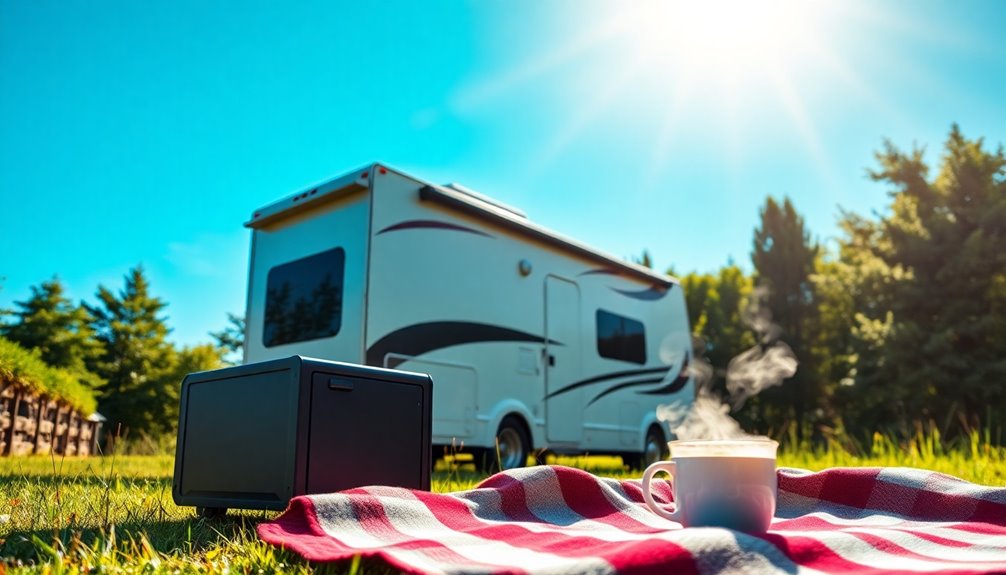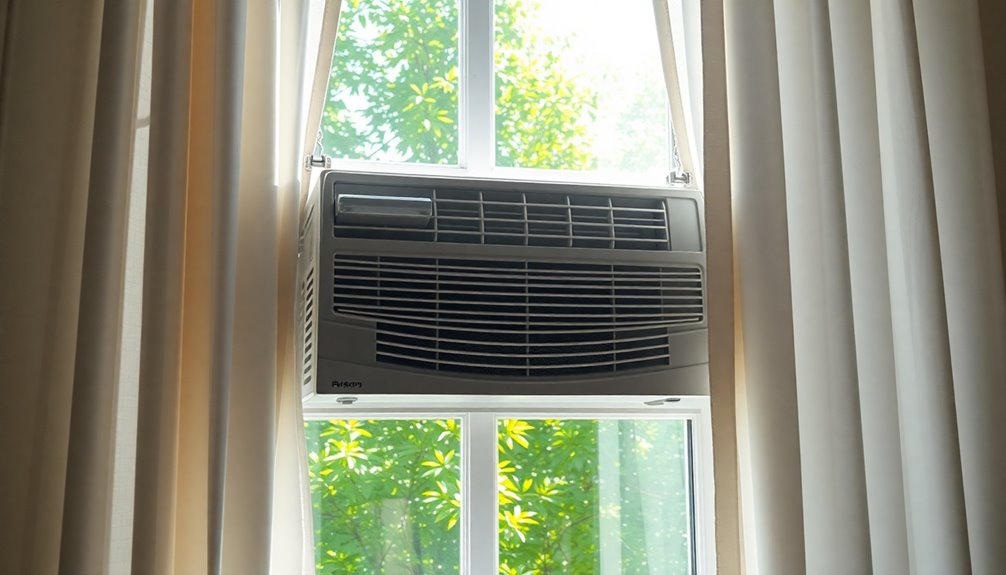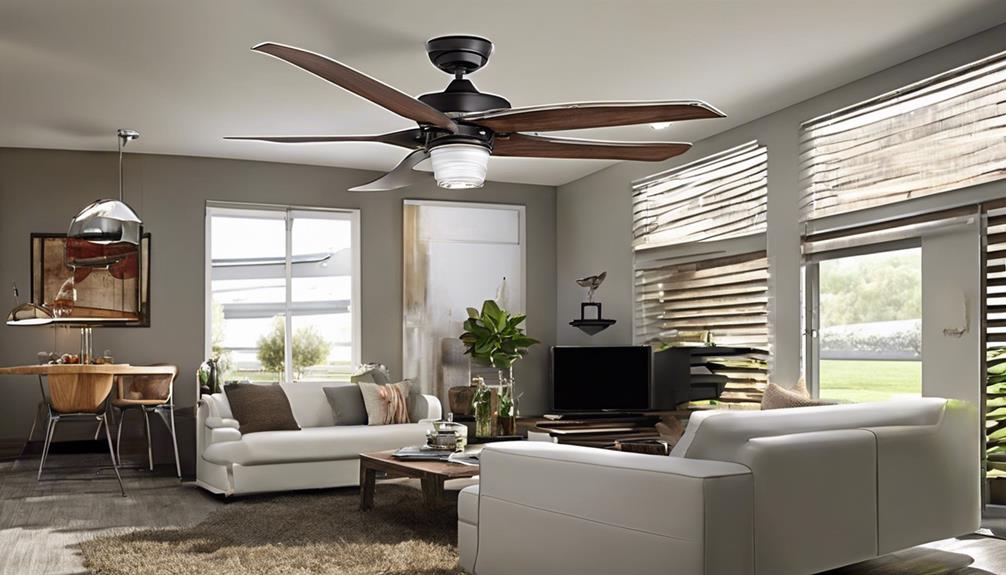If you're looking to power your RV air conditioner on your adventures, I've found that the right generator can make a world of difference. A minimum of 2,200 watts is essential for smaller units, while growing to 3,000-4,500 watts is beneficial for robust 15,000 BTU models. Soft start technology, like the MICRO-AIR EasyStart, can reduce startup surges, allowing you to use smaller generators effectively. Lightweight options are easier to manage, too, especially when you're on the go. Check out some top choices to find the perfect solution for your cooling needs and enhance your outdoor escapes.
Key Takeaways
- Look for generators with a minimum output of 2,200 to 3,000 watts to effectively power RV air conditioners.
- Consider models that support soft starters, which reduce startup current for larger AC units.
- Prioritize fuel efficiency to ensure longer usage during extended RV trips without frequent refueling.
- Opt for lightweight and portable generators (40-50 pounds) for easier setup and transportation.
- Check compatibility with the specific air conditioner model to avoid performance issues during operation.
MICRO-AIR EasyStart FLEX AC Soft Starter for RV Air Conditioners
When it comes to optimizing your RV air conditioner's performance, the MICRO-AIR EasyStart FLEX AC Soft Starter is an excellent choice for those frequently traveling to areas with limited power sources. This Bluetooth soft starter considerably reduces startup current by up to 75%, making it compatible with various AC systems, including 2-stage compressors and heat pumps. I love how its compact design allows for easy installation, even in tight spaces, perfect for DIY enthusiasts like me. Plus, it minimizes startup noise and prevents light flickering, creating a quieter environment. With advanced technology and intelligent fault detection, it not only boosts performance but also protects the compressor motor from damage. Overall, it's a smart investment for any RV traveler.
Best For: RV travelers who frequently visit areas with limited power sources and require efficient air conditioner performance.
Pros:
- Reduces startup current by up to 75%, enhancing compatibility with generators and inverters.
- Compact design facilitates easy installation, even in confined spaces.
- Includes intelligent fault detection to protect the compressor motor and extend its lifespan.
Cons:
- Some users reported capacitor failures, indicating potential reliability issues.
- A few customers experienced problems shortly after installation.
- Performance may vary based on specific AC unit compatibility.
MICRO-AIR EasyStart FLEX AC Soft Starter Kit for RV Air Conditioners
The MICRO-AIR EasyStart FLEX AC Soft Starter Kit is an excellent choice for RV enthusiasts who frequently find themselves in off-grid locations. I love how this Bluetooth-enabled soft starter reduces the startup current by up to 75%, allowing my air conditioner to run smoothly even when power is limited. It's compatible with various generators and inverters, making it versatile for different setups. Installing it was a breeze—just follow the straightforward instructions, and you're good to go! This kit works well with both 2-stage compressors and heat pump units, enhancing my AC's performance no matter where I am. If you're ready to power your adventures, the EasyStart FLEX is definitely a game-changer for your RV experience.
Best For: RV enthusiasts and outdoor adventurers looking for a reliable soft starter to enhance air conditioning performance in off-grid locations.
Pros:
- Reduces startup current by up to 75%, allowing for smooth operation in power-limited situations.
- Compatible with a variety of generators, inverters, and AC configurations, providing versatility.
- Easy installation process with straightforward instructions for quick setup.
Cons:
- May not be suitable for air conditioning units exceeding 6 tons.
- Bluetooth functionality may require a compatible device for full features.
- Initial cost may be higher compared to standard soft starters.
SoftStartRV Soft Start Kit for RV Air Conditioner (Pack of 2)
If you're looking to enhance your RV air conditioning experience, the SoftStartRV Soft Start Kit is an excellent choice, especially for those using smaller generators or onboard inverter systems. This kit operates seamlessly with two air conditioners on a 30 amp hookup, and its 100% waterproof design adds durability. Installation is straightforward, typically taking about 25-45 minutes, but if you're unsure about wiring, professional help is recommended. Users rave about its ability to reduce startup power spikes, greatly lowering amp consumption from over 40 amps to around 14-15 amps. Plus, it quiets the operation, eliminating the loud thump when starting. With great customer support and high satisfaction rates, this kit is worth considering for your RV adventures.
Best For: RV owners looking to improve air conditioning performance while using smaller generators or inverter systems.
Pros:
- Reduces power spikes during startup, preventing generator overloads.
- Significantly lowers power consumption, improving efficiency.
- Quieter operation compared to traditional AC startup.
Cons:
- Installation may require cutting and splicing wires, which can be complex for some users.
- Professional installation is recommended for those uncomfortable with electrical work.
- Initial investment may be higher compared to cheaper alternatives.
TOSOT GO COOL RV Air Conditioner 15000 BTU
Looking for a powerful yet efficient air conditioning solution for your RV? The TOSOT GO COOL RV Air Conditioner delivers an impressive 15,000 BTUs of cooling and 12,000 BTUs of heating, perfect for RVs between 16 to 24 feet. It efficiently cools spaces up to 600 sq ft while operating quietly at just 52 dB, allowing for peaceful nights. With a high efficiency EER of 8.5, it saves energy compared to older models. Installation is straightforward, though it requires a standard 14.25 x 14.25 inch rooftop vent. Plus, its WiFi capabilities let me control it remotely via the Gree+ app. Overall, it's a solid choice for enhancing comfort on the road. The sleek design seamlessly blends with your RV’s exterior, ensuring functionality without sacrificing aesthetics. Its durability and reliable performance make it one of the best RV air conditioner heater combos available, especially for those seeking year-round comfort. Whether you’re parked in a sunny desert or camping in chilly mountain regions, the TOSOT GO COOL ensures you stay comfortable no matter the season.
Best For: Those seeking an efficient and quiet air conditioning solution for mid-sized RVs, enhancing comfort during travel.
Pros:
- High cooling capacity of 15,000 BTUs, suitable for spaces up to 600 sq ft.
- WiFi-enabled for remote management and convenience.
- Operates quietly at 52 dB, ensuring a peaceful environment.
Cons:
- Not compatible with RVs that have ductwork, limiting installation options.
- Some users reported challenges with installation and alignment of mounting screws.
- Requires a specific circuit breaker or fuse, which may necessitate additional components.
TOSOT GO Cool RV Air Conditioner (15000 BTU)
For RV enthusiasts seeking a reliable climate control solution, the TOSOT GO Cool RV Air Conditioner stands out with its impressive 15,000 BTU cooling capacity. It's perfect for RVs between 16 to 24 feet long and efficiently covers spaces up to 600 square feet. With an EER rating of 8.5, it operates effectively in temperatures from 23°F to 115°F, ensuring comfort no matter the weather. The non-ducted configuration makes installation a breeze, and it comes with all the necessary materials. I love the smart WiFi control via the Gree+ app, allowing me to adjust settings remotely. Users rave about its quiet operation and powerful performance, making it a top choice compared to competitors like Dometic and Furrion.
Best For: RV enthusiasts looking for a powerful and efficient air conditioning solution for their mid-sized RVs. This unit is designed to deliver reliable cooling performance, even during the hottest summer days, ensuring ultimate comfort while on the road or parked at your favorite campsite. Its compact design and energy efficiency make it one of the best RV portable air conditioners for those who value both performance and practicality. With easy installation and maintenance, it’s a must-have for RV owners seeking dependable climate control without sacrificing precious space.
Pros:
- Quiet operation enhances comfort during use, making it ideal for peaceful camping experiences.
- Smart WiFi control via the Gree+ app allows for convenient remote management of temperature settings.
- Impressive cooling and heating capacity (15,000 BTU cooling and 12,000 BTU heating) effectively maintains comfort in extreme temperatures.
Cons:
- Not compatible with RVs that have existing ductwork, limiting installation options.
- Some users have reported issues with water drainage when operating in turbo mode.
- Lacks a soft start feature, which may impact initial power consumption during startup.
Soft Start Kit for RV Air Conditioner
The Wodli RV Air Conditioner Soft Start Kit is an ideal choice for RV enthusiasts who want to run their 15,000 BTU air conditioners on a 2200W generator without sacrificing power for other appliances. This kit reduces the starting current by 65-70%, allowing you to power refrigerators, microwaves, and TVs simultaneously. It's compatible with both 20A and 30A hookups, making it versatile for different setups. Installation is a breeze, thanks to color-coded wires and detailed instructions. I've found it considerably quieter during startup, which is a big plus. Plus, its durable design guarantees it can withstand the rigors of RV life. With an impressive customer rating of 4.9 stars, it's definitely worth considering for your next adventure.
Best For: RV enthusiasts looking to efficiently start their air conditioners with minimal power consumption while running other appliances.
Pros:
- Easy installation with color-coded wires and clear instructions.
- Reduces startup noise significantly, enhancing user experience.
- Compatible with various power hookups, making it versatile for different RV setups.
Cons:
- May void warranties on newer RVs if installed.
- Limited to specific air conditioner models (15,000 BTU).
- Some users might find the initial cost higher compared to traditional setups.
RV Air Conditioner 8188 BTU Non-Ducted 2-in-1 Unit for RVs and Campers
When it comes to staying cool in your RV, the RV Air Conditioner 8188 BTU Non-Ducted 2-in-1 Unit stands out with its powerful cooling capacity and quiet operation. This unit is perfect for anyone looking for an efficient solution for heating and cooling on the go. Weighing just 25 kg, it fits standard 14-inch roof openings, making installation a breeze. With an impressive cooling capacity of 8188 BTU and a heating capacity of 3412 BTU, it handles various climates effortlessly. I appreciate its energy-efficient design, which helps reduce fuel consumption. Plus, the 45 dB noise level guarantees a peaceful environment while I relax. Overall, this air conditioner is a reliable choice for my adventures on the road.
Best For: RV owners and campers seeking an efficient, quiet, and versatile heating and cooling solution for their travels.
Pros:
- Energy-efficient design helps reduce fuel consumption and operating costs.
- Quiet operation at 45 dB ensures a peaceful environment while using the unit.
- Easy installation compatible with standard 14-inch roof openings.
Cons:
- Limited heating capacity of 3412 BTU may not suffice for extremely cold climates.
- Weight of 25 kg might be cumbersome for some users to handle during installation.
- Requires compatible sunroof size, potentially limiting installation options for some RV models.
RecPro RV Air Conditioner (15K, Non-Ducted)
Designed specifically for campers, fifth wheels, and food trucks, the RecPro RV Air Conditioner (15K, Non-Ducted) stands out with its energy-efficient heat pump and cooling capabilities. It operates on 110-120V and features a low amp draw, so I can run multiple appliances at once without a hitch. I love the dehumidifying function that keeps excess moisture at bay, making my adventures more comfortable year-round. At just 55.4 decibels, it's quieter than many competitors, comparable to a gentle rain. The user-friendly remote control and touch screen LED display make adjustments effortless. Plus, installation is a breeze; I managed it without professional help, and the quality has truly exceeded my expectations compared to older models like Dometic.
Best For: Campers, fifth wheels, and food truck owners seeking an energy-efficient and quiet air conditioning solution. Best For: Campers, fifth wheels, and food truck owners seeking an energy-efficient and quiet air conditioning solution. These units are designed to provide powerful cooling without excessive noise, making them ideal for small spaces and mobile setups. Whether you’re outfitting a cozy living area or upgrading a mobile kitchen, these models stand out among the best garage heaters and air conditioners for reliability and performance. Their compact design ensures easy installation, while energy-saving features help keep costs down.
Pros:
- Energy-efficient with a low amp draw, allowing for simultaneous operation of multiple appliances.
- Quiet operation at just 55.4 decibels, enhancing comfort without disruptive noise.
- Easy installation process, often manageable without professional assistance.
Cons:
- Higher pricing in Canada due to conversion rates and shipping costs.
- Potential inflated prices from certain Amazon sellers, requiring careful shopping.
- Limited availability in some regions, making direct purchasing from U.S. distributors a recommendation.
CARROPECAS Soft Start for RV Air Conditioner
For RV enthusiasts looking to maximize comfort while minimizing power consumption, the CARROPECAS Soft Start for RV Air Conditioner stands out as an essential upgrade. This device makes it easy to start a 15,000 BTU air conditioner with just a 2,200W generator, reducing startup current by 65%-70%. This means I can run multiple appliances at once—think refrigerator, microwave, and TV—without worrying about overloading the generator. Installation is straightforward, thanks to clear instructions and color-coded wires. Plus, it's compatible with various brands, including Dometic. The safety features, like overload protection and insulated housing, offer peace of mind. With a solid customer rating of 4.6 stars, it's clear that many RVers are enjoying enhanced comfort on their adventures.
Best For: RV enthusiasts looking to enhance their air conditioning experience while managing power consumption effectively.
Pros:
- Reduces startup current by 65%-70%, preventing generator overload and enhancing efficiency.
- Easy installation with detailed instructions and compatibility with various air conditioner brands.
- Safety features like overload protection and insulated housing provide added peace of mind.
Cons:
- Requires two kits to run two air conditioners simultaneously, which may increase costs.
- Limited to use with generators of at least 2,200W for optimal performance.
- Some users may find the installation process challenging if not familiar with electrical systems.
FOGATTI RV AC Unit 13500BTU Non-Ducted Rooftop Air Conditioner
The FOGATTI RV AC Unit 13500BTU Non-Ducted Rooftop Air Conditioner stands out with its impressive 13,500 BTU cooling capacity, making it an ideal choice for RV enthusiasts who crave quick relief from sweltering heat. I love how it cools the interior within just 10 minutes, thanks to its dual compressor and R410A refrigerant. Plus, the adjustable fan speed kicks in within 3 minutes for even better comfort. Installation is a breeze, and its lightweight design means I can set it up without any hassle. Operating at a quiet 65dB, it's perfect for relaxing or sleeping. Just keep in mind, taller RVs might need extra fans for peak airflow. Overall, it's an affordable option that delivers reliable performance!
Best For: RV enthusiasts looking for a powerful and efficient air conditioning solution that cools quickly and is easy to install.
Pros:
- Impressive 13,500 BTU cooling capacity for quick temperature relief in hot climates.
- Easy installation with a lightweight design, compatible with most RV models.
- Ultra-quiet operation at 65dB, ensuring comfort during relaxation or sleep.
Cons:
- May require additional fans for optimal airflow in taller RVs.
- Some users report noise issues under certain conditions.
- Airflow can be less effective in specific RV configurations without modifications.
RecPro RV Air Conditioner (13.5K, Non-Ducted)
If you're looking for a reliable air conditioning solution for your RV, the RecPro RV Air Conditioner (13.5K, Non-Ducted) stands out with its impressive cooling performance and low amp draw. This unit effectively cools spaces of up to 351 cubic feet, even in sweltering temperatures. I love the remote control feature, allowing me to adjust settings from anywhere in my RV. Its energy efficiency (10.38 BTU/Watt) means I can run multiple appliances without issues. Plus, the dehumidifying function helps keep the air comfortable. Weighing in at 112 pounds, it's surprisingly easy to install. With a noise level comparable to gentle rain, it's a quiet companion on my adventures. Overall, I highly recommend it for RV enthusiasts!
Best For: RV enthusiasts looking for an efficient and quiet air conditioning solution that can handle high temperatures and humidity.
Pros:
- Energy efficient with a cooling performance of 10.38 BTU/Watt, allowing simultaneous operation of multiple appliances.
- Remote control feature provides convenience for adjusting settings from anywhere in the RV.
- Quiet operation at 59.7 dB, creating a comfortable environment similar to gentle rain.
Cons:
- Mixed customer service experiences, with varying reports on responsiveness and return issues.
- Weight of 112 pounds may require assistance for installation.
- Warranty information is not readily available and must be requested.
MICRO-AIR EasyStart Breeze 399 – Soft Starter for RV Air Conditioners
Looking for a reliable solution to power your RV air conditioner without the headache of high startup currents? The MICRO-AIR EasyStart Breeze 399 is a game changer for RV enthusiasts like me. It's designed for air conditioning units up to 15,000 BTU and works seamlessly with 2200-watt generators. This soft starter reduces startup noise and lowers starting currents, making it perfect for running two air conditioners on a 30-amp power cord. Plus, the compact design makes installation a breeze, even for those with basic wiring skills. I found the customer support to be excellent, offering helpful guidance when needed. With EasyStart Breeze 399, I can enjoy my adventures without worrying about power issues!
Best For: RV enthusiasts looking for a reliable and efficient way to power air conditioners with reduced startup currents and noise.
Pros:
- Quieter operation during startup enhances comfort inside the RV.
- Easy installation with comprehensive guides and minimal tools required.
- Excellent customer support provides assistance and troubleshooting help.
Cons:
- Some users may find installation diagrams unclear or confusing.
- Compatibility is limited to air conditioners with capacities up to 15,000 BTU.
- May require additional adjustments for specific RV models or setups.
Spartan Power SpartanStart Soft Start Kit for RV Air Conditioner
For RV enthusiasts seeking a reliable solution to power their air conditioners without straining their batteries, the Spartan Power SpartanStart Soft Start Kit stands out. It supports AC units up to 20,000 BTU and operates at 120 volts with a wattage of 2200. The installation is a breeze, taking about 10 minutes with only three wires needed. I love how it reduces the starting current considerably—my Penguin II dropped from 49.5A to just 21.3A. Plus, it's compatible with generators and prevents them from stalling. The quiet startup is a nice touch too. With a three-year warranty, this kit promises longevity, making it a worthwhile investment for any RV adventurer.
Best For: RV enthusiasts looking for an efficient and easy-to-install solution to reduce air conditioner startup current and extend battery life.
Pros:
- Reduces starting current significantly, improving battery efficiency.
- Quick installation process, taking approximately 10 minutes with minimal wiring.
- Compatible with generators, preventing stalling and ensuring smooth operation.
Cons:
- Some users prefer alternative connectors over those included in the package.
- May require additional soldering or screw-on cap connectors for optimal installation.
- Longevity may vary based on usage, with limited usage expected for best results.
Soft Start for RV Air Conditioner
The Aoteda Soft Start for RV Air Conditioner is a game-changer for those who want to enjoy the comforts of air conditioning without the worry of overloading their generator. With its ability to reduce starting current by 65%-70%, I can run my 15,000 BTU AC without tripping the circuit breaker, even while using other appliances. The installation is straightforward, though I found the instructions a bit vague at times. Still, the durable materials provide peace of mind, and the built-in protections enhance safety. Plus, at under $100, it's a budget-friendly option compared to similar units. Just make sure to check compatibility with your AC model, especially if you have an older unit. Overall, it's a solid investment for RV enthusiasts!
Best For: RV enthusiasts looking to operate air conditioners without overloading their generators or tripping circuit breakers.
Pros:
- Reduces starting current by 65%-70%, allowing simultaneous use of multiple appliances.
- Constructed with durable materials and built-in safety protections for reliable operation.
- Affordable price point compared to similar UL or ETL listed units, making it budget-friendly.
Cons:
- Installation instructions can be vague, leading to potential challenges for some users.
- Compatibility with older AC models may require additional verification.
- Mixed user experiences regarding installation clarity may necessitate external resources.
Briidea Soft Start for RV Air Conditioner
A game-changing feature of the Briidea Soft Starter is its ability to start a 15,000 BTU air conditioner using a compact 2200W generator. I love how it lets me run other appliances at the same time without worrying about overload. Plus, it works seamlessly on a 20A household hookup or even supports two air conditioners on a 30A hookup with two soft starters. The 65%-70% reduction in starting current not only prevents generator issues but also keeps things quieter, which is great for a good night's sleep. Installation's a breeze with clear wiring instructions, and it fits various brands like Dometic and Coleman. Despite mixed reviews on customer support, I find it an effective and affordable solution for RV users.
Best For: RV users looking for a compact and efficient solution to start their air conditioners without needing a larger generator.
Pros:
- Significantly reduces starting current by 65%-70%, preventing generator overload.
- Compatible with various air conditioner brands, making it versatile for different RV setups.
- Easy installation process with clear wiring instructions, enhancing user experience.
Cons:
- Mixed reviews on customer support, with some users experiencing communication challenges.
- Some reports of initial functionality issues, leading to user frustration.
- Performance may vary depending on the specific air conditioner brand and generator used.
Factors to Consider When Choosing a Generator for RV Air Conditioner

When I'm choosing a generator for my RV air conditioner, I always think about power output requirements first. It's also important to contemplate the type of generator, how noisy it is, and its fuel efficiency. Plus, I can't forget about portability and weight, especially when I'm on the move.
Power Output Requirements
Choosing the right generator for your RV air conditioner is essential, and I often find that many overlook the power output requirements. To guarantee your unit runs smoothly, you'll need to take into account its power output, typically measured in BTUs. Most RV air conditioners require a generator with a minimum output of 2,200 to 3,000 watts to handle the startup surge, which can be notably higher than the running wattage.
To calculate the total wattage needed, I suggest adding your air conditioner's running wattage—usually around 1,200 to 1,500 watts for a 15,000 BTU unit—to any additional appliances you plan to use simultaneously. It's wise to choose a generator that provides at least 20-30% more wattage than your calculated total. This extra capacity will help accommodate potential power spikes and prevent overloading.
Additionally, I recommend looking for generators compatible with soft starters. These devices can reduce the starting current by 65-75%, allowing smaller generators to effectively power larger air conditioning units. By taking into account these power output requirements, you'll guarantee a more enjoyable and comfortable RV experience.
Generator Type Selection
Understanding the power output requirements is just the beginning; selecting the right type of generator plays a significant role in ensuring your RV air conditioner operates efficiently. I've found that inverter generators are a fantastic choice for RV users. They provide clean power, which is essential for sensitive electronics, and they typically run quieter than traditional generators.
When you're choosing a generator, make sure it has enough starting wattage to handle the air conditioner's initial surge. A 15,000 BTU AC, for example, might require around 3,000 to 4,500 starting watts, which is usually 2 to 3 times its running wattage. Also, I recommend looking for a generator with a low Total Harmonic Distortion (THD) rating—ideally below 5%—to protect your air conditioning unit's longevity.
Fuel tank capacity is another factor to take into account. You'll want a generator that can run for several hours without frequent refueling, especially during those hot summer days. Finally, portability is key; a lightweight model makes it much easier to transport and store. Choosing the right generator type can truly elevate your RV experience!
Noise Level Considerations
A quiet generator can make all the difference during your RV trips, especially when running an air conditioner. When I'm camping, I prefer generators that operate between 50 dB to 60 dB. This range is similar to a normal conversation, allowing for a comfortable environment without the constant drone of noise. Generators with inverter technology are particularly appealing since they not only run quieter but also provide cleaner power for sensitive electronics.
I've also found that some models come equipped with noise-reducing enclosures or designs, which can be a lifesaver in peaceful camping spots or when I'm close to fellow campers. One aspect I always consider is the startup noise. Air conditioners require a significant inrush current, leading to a higher initial noise level. To combat this, I recommend looking into soft start kits that can help lessen that initial spike.
Lastly, it's essential to check the manufacturer's specifications for both the generator and the air conditioner. Ensuring they're compatible while maintaining a low noise profile can really enhance the quality of my camping experience.
Fuel Efficiency Ratings
When it comes to selecting a generator for your RV air conditioner, fuel efficiency ratings play an essential role in keeping your trips economical. These ratings indicate how much energy a generator consumes compared to its output, typically measured in watts per gallon of fuel. This information helps me determine operational costs during extended use.
I've found that generators with higher efficiency ratings convert more fuel into usable electricity. This means I can spend less time refueling and save on overall fuel expenses during my RV adventures. The most efficient generators can run for about 8-12 hours on a single tank of gas while maintaining a load of 50% to 75%. This is perfect for powering my RV air conditioner without constant interruptions.
However, I've learned that fuel efficiency can vary due to load demand, generator maintenance, and environmental conditions. So, it's vital to take into account these factors when evaluating performance. Understanding fuel efficiency ratings helps me select generators that not only meet my power needs but also minimize fuel consumption, ultimately leading to cost savings in the long run.
Portability and Weight
Choosing the right generator for my RV air conditioner means I can't overlook portability and weight. As an RV owner, I've learned that a lightweight generator makes all the difference when setting up camp or hitting the road. Smaller models usually weigh between 40 to 50 pounds, which is manageable, while larger units can exceed 100 pounds, making them cumbersome to handle.
I've found that many generators come equipped with built-in handles or wheels, enhancing their portability. This feature is invaluable when I need to move the generator around quickly. It's also essential to take into account the dimensions of the generator. Compact designs fit snugly into my RV's limited storage space, ensuring I maximize my available room.
Some of the most convenient portable generators even feature a folding frame, allowing for easy transport and storage. These thoughtful designs make my outdoor adventures more enjoyable, as I can focus on relaxation instead of wrestling with heavy equipment. Ultimately, prioritizing portability and weight helps me choose a generator that fits seamlessly into my RV lifestyle, so I can power my adventures without unnecessary hassle.
Compatibility With Appliances
Compatibility is vital for a seamless RV experience, especially when it comes to powering your air conditioner. I always make certain that the generator I choose has sufficient wattage to handle both the starting and running watts of my RV air conditioner. For a typical 15,000 BTU unit, I've found that a generator of at least 2,200 watts is necessary.
It's also important to verify that the generator is compatible with the specific type of air conditioner I own. Some models need soft starters to manage inrush current, preventing overloads. I make sure to check the generator's voltage output too; it should match my air conditioner's requirements, which is usually between 110-120 volts.
Additionally, I consider whether I'll want to run other appliances simultaneously. If so, I opt for a generator with a higher wattage capacity. I specifically look for generators designed to operate with RV air conditioners, as they're built to handle the surge power demands during startup. By keeping these factors in mind, I can confidently power my RV adventures without worry.
Frequently Asked Questions
What Size Generator Do I Need for My RV Air Conditioner?
When I was figuring out what size generator I needed for my RV air conditioner, I learned it's essential to take into account the AC unit's wattage. Most RV air conditioners require around 2,000 to 4,000 watts to start, so I opted for a generator that could handle that peak load. I recommend checking your specific unit's requirements and choosing a generator with a bit more capacity to guarantee smooth operation during those hot summer days.
How Do I Safely Connect a Generator to My RV?
When I connect my generator to my RV, I always prioritize safety. First, I make sure the generator's output matches my RV's needs. I use a heavy-duty extension cord to link the generator to the RV's power inlet. Before starting the generator, I double-check that all breakers are off. Once it's running, I turn on the breakers gradually. This way, I avoid any electrical surges and keep everything running smoothly.
Can I Run Other Appliances With My RV Air Conditioner on a Generator?
Think of your generator as the heart of your RV, pumping power to keep everything alive. Yes, you can run other appliances alongside your RV air conditioner, but you'll need to be cautious. I always check the generator's wattage capacity first. If the total wattage of your AC and other devices exceeds that limit, you risk overloading it. Balancing those power needs is key to a smooth adventure on the road!
What Fuel Types Are Best for RV Generators?
When choosing a fuel type for my RV generator, I usually consider gasoline, propane, and diesel. Gasoline generators are common and easy to find, but I've found propane to be cleaner and more efficient. Diesel generators offer better fuel economy and longevity, but they can be pricier. Ultimately, I prefer propane for its convenience and lower emissions, but I recommend evaluating your needs and preferences before deciding on the best option for you.
How to Maintain My Generator for Optimal Performance?
Did you know that regular maintenance can extend your generator's lifespan by up to 50%? To keep my generator running smoothly, I check the oil levels and change the oil regularly. I also clean or replace the air filter and spark plugs as needed. It's vital to inspect the fuel system for leaks and keep it clean. Finally, I run the generator monthly to guarantee it stays in top shape.
Conclusion
As you commence your RV adventures, don't underestimate the power of the perfect generator. With options like the MICRO-AIR EasyStart and TOSOT GO COOL, you'll find fantastic solutions to fuel your journey. Selecting the right generator not only keeps your air conditioner cool but also enhances your overall experience, ensuring comfort and convenience. So, gear up and get ready for glorious getaways, where the sun shines bright and the air stays invigoratingly cool!

























